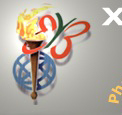| Select
a day
|
__
|
| |
| The Track & Field ("Athletics") event was held
at the Nepstadion (that is, the People's Stadium) in Pest, the
largest stadium in Hungary. Once you find the entrance (one
of the Australians put it well: "We always knew where we were,
it's just that the buildings got lost!"), it opens up before
you and you get a real sense of how large it is. |
|
| One person having a very good day at Nepstadion
was Iija Ignatiew of Finland (at left in photo). Not only did
she win two gold medals today (in 100 meters and high jump),
not only is she happy to be alive, but today was her 33rd birthday,
too! |
|
| Around 1989, Iija began to get sick with primary
pulmonary hypertension. As a youngster, and until the age of
22, she had been involved in track events as a member of an
athletic club. Unfortunately, because she was always athletic
and upbeat, her symptoms were not obvious. Only after her heart
was affected did the doctors realize that her lungs had been
quite damaged. She was quite sick, confined to a wheelchair,
unable to pick up her fifteen month old daughter, unable to
do even the simplest task for herself. She found it very frustrating.
By the time Iija was put on the waiting list, she didn't even
have enough energy to have any strong emotions; she was never
really happy, never really angry, she was just existing. |
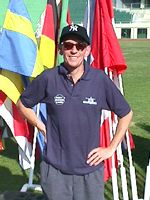
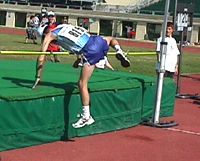
|
|
While Iija waited three and a half weeks for a heart and
lungs, the doctors were predicting that she would die within
two weeks if the transplant didn't arrive. She was so desperate
that she thought that even if the transplant gave her just
a few more months of life, it would be worth it.
|
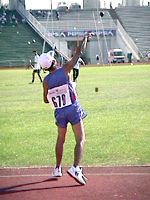 |
| Fortunately, it has given her five extra years of life, for
which she is very grateful. Even though she suffered several
bouts of rejection and problems with infections after the transplant,
she has overall done very well. Iija appreciates every day she's
given, and is very happy to be alive. |
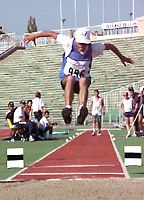 |
| When she was sick, she said to herself "If I could
just run the 500 meter one more time, I would be so happy."
Now she runs whenever she gets the chance, including the Finland
National Transplant Games, the EuroTransplant Games, the Scandinavian
Transplant Games, and previous World Transplant Games. In Sydney,
she won two silver medals (100 meter and long jump), and one
bronze (200 meters). |
|
| When asked why she decided to come to Budapest,
she replied, "...to be with people who can really understand
what life is like after transplantation. And to win! Also, I
have always wanted to win three gold medals, so maybe tomorrow!"
Iija has two more events on Sunday, so she may get her birthday
wish! |
|
| I also met Brett Jones, a ten- year-old Australian who was
introduced by his father as "a medical miracle." Brett was born
without an immune system. At the time, there were only about
twenty other such cases and the doctors gave him a very grim
prognosis. After getting a bone marrow transplant at the age
of one in 1990, Brett has done very well. In Sydney at the XI
World Transplant Games, he competed in five events. Brett is
pleased to be here in Budapest, where he is the youngest boy
taking part in the Games. Brett's father, Stephen Jones, has
become a fundraiser for children's hospitals and has started
a fundraising organization for sick kids called "Kids Like Brett."
Brett is taking home at least one bronze medal from today's
competition. (Brett is at the far right in the group photo.) |
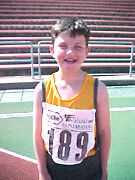
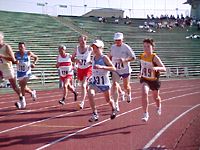
|
|
Two Italian competitors, Giovanni Antichi and Carolina Panico,
were camped out in the cool green grass in the field in the
center of the stadium, watching the races. I asked them why
they came to the Games, and they said "We love sports, we
love people, and we want to help people learn about donation,
to help people who are waiting for transplants." Giovanni
received a kidney transplant five years ago (in 1994), lives
in Savona (near Genoa), and is competing in skittles, swimming,
and volleyball. Carolina had a kidney transplant fifteen years
ago (in 1984), lives in Naples, and is competing in volleyball,
skittles, and bicycling.
In addition, Carolina wrote this message for our viewers:
|
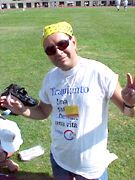
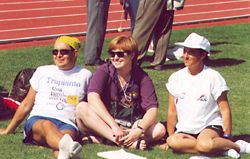
|
|
(which is roughly translated as: "I hope that the 12,000
people in Italy who are on the waiting list will get the real
opportunity to be with us at the next Games, so that we can
enjoy them together!") Hear, hear!
|
|
|
Foils and Sabers Under
the Dome
Story
by Robert
Garypie
Photography by Gary Green and
Peter Ottlakan
Audio by Douglas
Armstrong
VIEW
RESULTS when available
On the top floor of a converted synagogue, the fencing was
underway when we arrived. The domed ceiling of the competition
room at this venue is painted in blue, yellow, red, and beige
geometric patterns. The building was a synagogue until World
War II. It then became a storage facility until 1989. Then
the building came to life again as a sports facility. The
large stained glass windows are still in place, tinting the
beams of sunlight shades of blue and yellow.
|
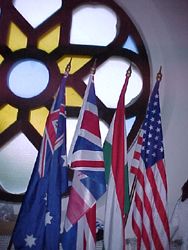 |
|
Gary Green, TransWeb volunteer and World Transplant Games
Federation Councillor, patiently described the competition
to onlookers. According to Gary, accidental fencing injuries
are rare but can be fatal. Gary has been fencing for twenty
years; his tour in the Peace Corps drew on his knowledge of
fencing as he was assigned to coach the Chilean Olympic team
a few years back.
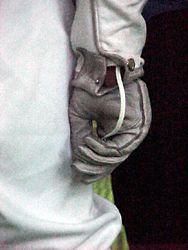
|
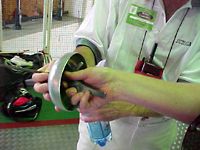
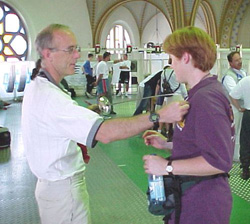
|
|
Today's competitors become instantly anonymous once they
put on their protective equipment. A black mesh face guard
disguises all emotion and expression. On the electrified metal
floor, points are scored when one's weapon contacts the torso
of the opponent.
With long wires running from the walls to the competitors,
lights and buzzers come to life when contact is made. Each
fencer has three wires that connect to the scoring computer
on the wall. One for his torso-area jacket, and two from his
weapon. Scoring is based on using the tip of the weapon to
strike the torso of the opponent.
The men and women from Hungary, Australia and USA were fencing
for ten hits to win each match. The round robin competition
allowed every competitor to meet all the others at some point
in the day. At the Olympic level, Hungarian saber teams are
famously successful and today's officials were Hungarian fencing
Olympians.
|
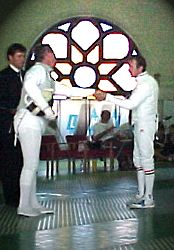
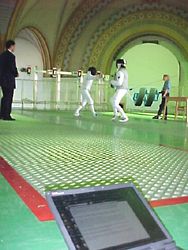
|
|
Two American men, one Australian woman, one Hungarian woman
and two Hungarian men participated.
Peter Cappuccilli of Team USA, hailing from Rhode Island,
took a silver and a bronze for Team USA. A kidney recipient,
Cappuccilli was cheered on by his son at the event. After
losing to Gyorgy Szekely of Hungary, who is also the president
of the local Transplant Games organizing committee, Cappuccilli
remarked, "In the last half of that bout he began to really
fence, which is what I wanted." Just prior to the medals ceremony
I asked Cappuccilli how he liked competing in Budapest. "Are
you kidding? It's great! My son is here with me -- he just
graduated from college -- and I get to spend five days with
him in Budapest. He lives in Florida and the two of us travelled
here together. It's just great!"
Having begun fencing just a year ago, Cappuccilli is thrilled
to be here. "Just wait two years -- I'll see you in Japan!"
|
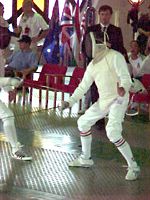
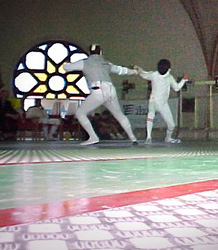
|
|
The quiet of the medals ceremony room turned to a deafening
roar of clapping and cheering when the medals were presented.
Then the Hungarian national anthem was played and the crowd
fell silent again. Strains of Hungarians singing their anthem
filled the room.
In the corner, Dr. Joszef Ree, the Hungarian WTGF councillor,
stood and looked on. As the anthem reached its crescendo,
Ree (who was largely responsible for these Games' coming to
Budapest) looked around the room. A heartfelt smile slowly
crept across his face as he must have realized that all of
his hard work paid off. The athletes are here, the medals
are being awarded, and Budapest has become a great home for
the World Transplant Games.
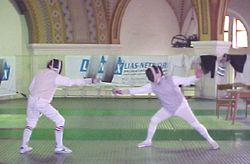
|
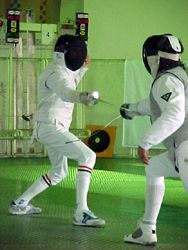
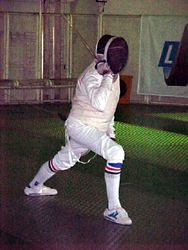
|
|
|
